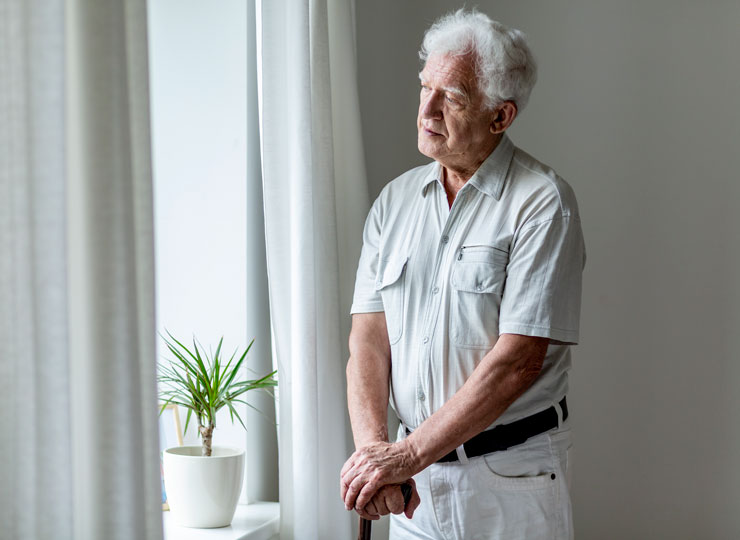
March 22, 2023
A new study sheds light on why social isolation can be so bad for the brain. It found that compared to their more social peers, people who are more socially isolated and who feel lonely are more likely to exhibit many of the lifestyle and health behaviors that put them at higher risk of developing Alzheimer’s disease. While it’s difficult to untangle which came first, the social isolation or the risk factors for dementia, the findings underscore the important role that social connection may play in helping to keep the brain in good working order as we age.
For the study, researchers in Canada analyzed health data from 502,506 men and women who were part of the UK Biobank, a huge medical database in Britain, and 30,097 people enrolled in the ongoing Canadian Longitudinal Study of Aging. Participants underwent regular health assessments. They also filled out detailed questionnaires about their lifestyle habits, including information about how often they felt lonely, how frequently they socially interacted with others, and how much social support they had.
The researchers found a close association between many of the behavioral and lifestyle factors that put people at increased risk of developing Alzheimer’s disease and a lack of social connection and support. People who smoked or drank excessively, slept poorly or got little exercise — all risk factors for Alzheimer’s disease — were more likely to report feeling lonely and to lack social support. In the British database, for example, current smokers were 20 percent more likely to report feeling lonely, and 10 percent more likely to have a weak social network. Canadians who engaged in exercise, on the other hand, were 20 percent less likely to feel lonely and 27 percent less likely to have poor social support.
Interestingly, watching lots of TV, a passive activity, was tied to lower levels of social support and increased feelings of loneliness, whereas using the computer, a more interactive medium, was linked with less loneliness and stronger social support. Participating in religious activities, which typically involve group interactions, was associated with reduced subjective and objective social isolation.
Medical and mental health conditions that increase the risk of Alzheimer’s disease, such as poor hearing or vision impairment, heart disease and depression, were similarly tied to an increased risk of loneliness and social isolation. People who reported they had trouble hearing others in settings with high levels of background noise, for example, were 29 percent more likely to report feeling lonely and 10 percent more likely to report having a poor social support network; individuals who used a hearing aid, on the other hand, tended to have lower levels of loneliness and a supportive network of friends and family. Diabetes and heart disease, both recognized risk factors for dementia, were likewise associated with greater feelings of loneliness and lack of social support.
Many factors determine who will ultimately develop dementia, but the findings underscore the important ties between social isolation and risk factors for Alzheimer’s disease. Poor social relationships have been associated with up to a 50 percent increased risk of dementia, a 29 percent risk of heart disease and a 32 percent increased risk of stroke. Loneliness and lack of social support are also associated with higher rates of depression, a known risk factors for dementia.
The problem is not a small one. The National Academies of Sciences, Engineering, and Medicine has reported that a third of adults 45 and over feel lonely, and nearly a fourth of adults 65 and over are socially isolated. Those numbers have only increased during the Covid-19 pandemic. The study also offers important lessons for those caring for a loved one with Alzheimer’s disease. Caregiving is a stressful and often lonely experience, and relationships with friends can suffer as the day-to-day demands of caretaking become increasingly consuming.
Scientists are unsure why or how loneliness and lack of social support may be linked to dementia. Some speculate that social interaction may help to keep the brain stimulated and help to build connections between brain cells. It is possible that the brain of lonely people may be less able to compensate for the onslaughts of a disease like Alzheimer’s. But experts say that nobody should blame themselves for feeling lonely or disconnected. A number of measures that may help to foster social connections and curb feelings of loneliness, among them:
- Local Y’s and groups like AARP offer group fitness classes geared to older people that can help to forge friendships. Physical activity helps to diminish stress and is also good for the brain.
- Community centers often offer courses in painting, crafts, writing, music, dance, gardening, cooking and other activities. Many are tailored to caregivers who often have few chances to connect with others and reap the benefit of mutual support.
- Join a book club or schedule a monthly potluck supper gathering.
- The internet and social media offer ways to connect. Groups like Meetup.com can be a way to connect with others who have similar interests or life experiences. But experts also warn that social media, with its emphasis on depictions of others having a good time, can also make people who are feeling lonely or isolated feel even worse.
- Reach out to a neighbor to ask how they are doing and if there’s anything you can assist with. Make a phone call to a friend. Chances are, you will both end up feeling better.
By ALZinfo.org, The Alzheimer’s Information Site. Reviewed by Marc Flajolet, Ph.D., Fisher Center for Alzheimer’s Research Foundation at The Rockefeller University.
Source: Kimia Shafighi, Sylvia Villeneuve, Pedro Rosa Neto, et al: “Social isolation is linked to classical risk factors of Alzheimer’s disease-related dementias.” PLOS One, February 1, 2023











